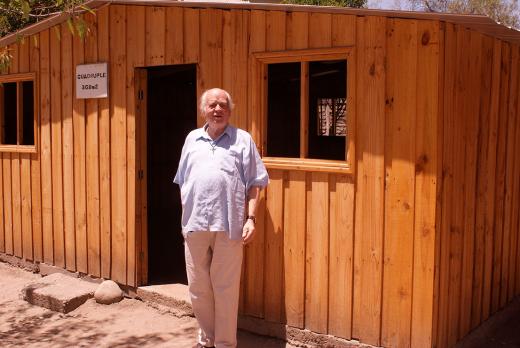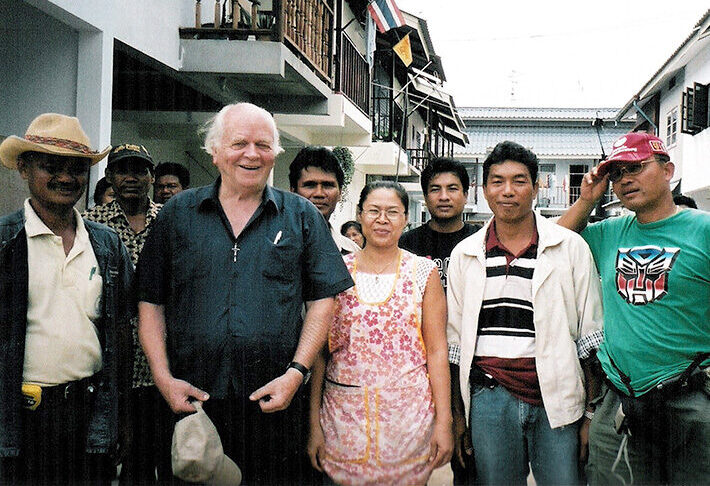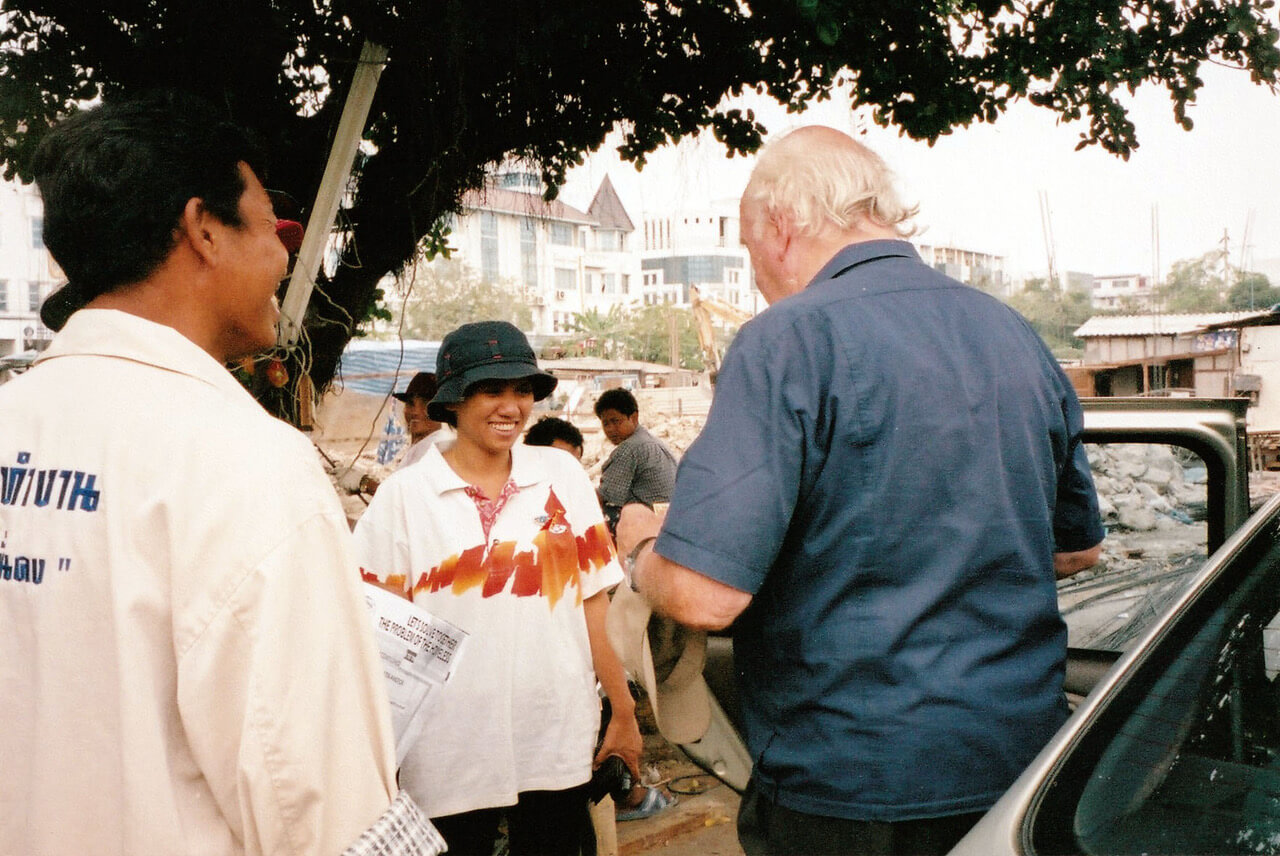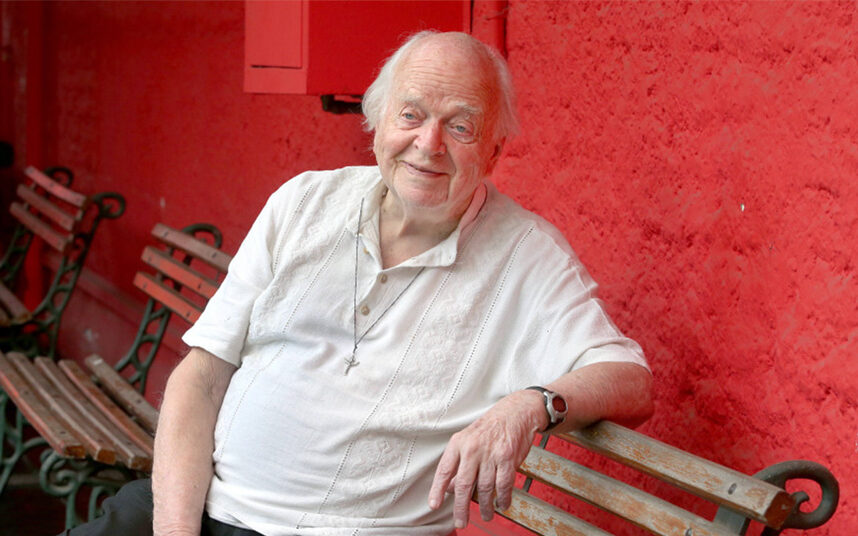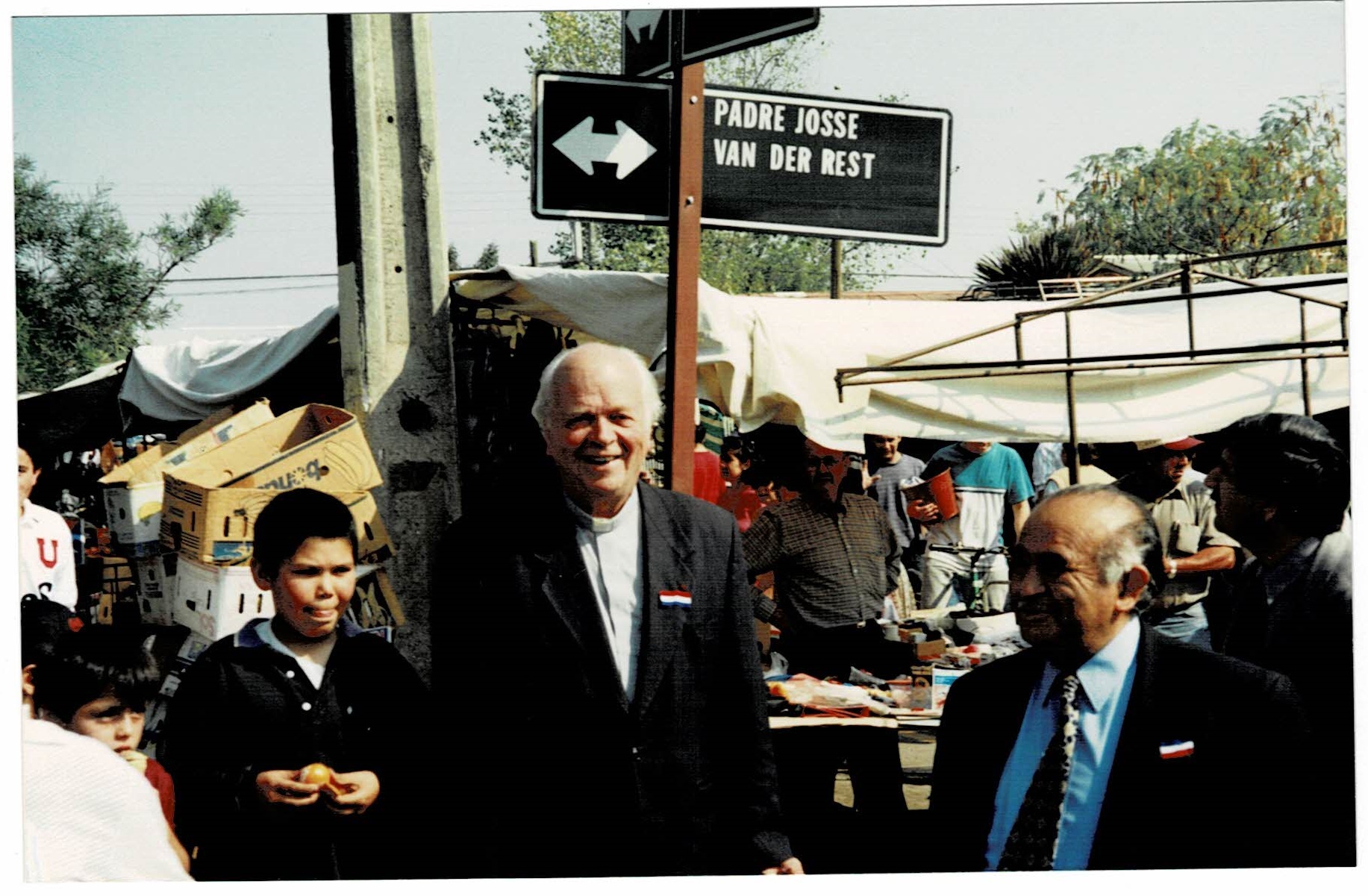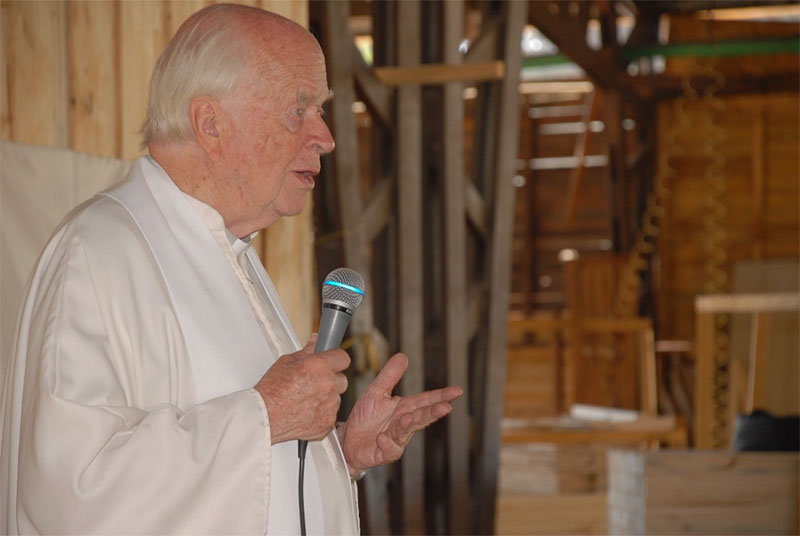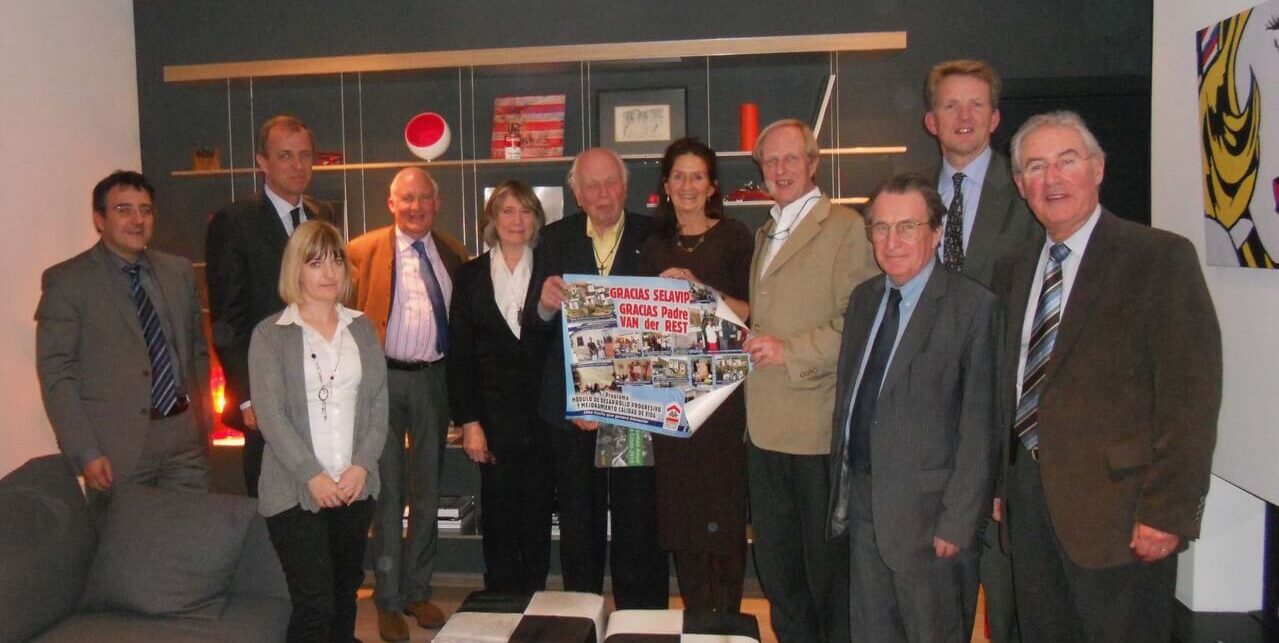
Our founder
Josse van der Rest Emsens sj.
His concern has always been the urban poor, those who in the cities seem to be “left over” because they do not have access to a piece of land where they can install a shelter.
“The problem is not the house, but the land: with a piece of land the poor are able to build their home.”
His story
The founder of SELAVIP is Father Josse van der Rest (1924 – 2020), a Jesuit priest born in Belgium, who lived in Chile from 1958 until his death.
Josse Gustave Marie Ghislain, born in Brussels on March 9, 1924, passed away silently on July 24, 2020, during the COVID-19 pandemic.
Known as Padre Josse, Father Josse, Père Josse, Oncle Josse or simply Josse, he was known in Chile as "The Father of the mediaguas", the mediagua is called that because its name comes from its cover that used to have a single inclination. Josse, very humbly, points out that "it was the people who invented it, the only thing I did was industrialize it so that people would pay as little as possible". He left an indelible mark on many men and women, both in his two countries, Belgium and Chile, and in the rest of the world.
The Second World War played a decisive role in his life. He always remembered the day he arrived in the Black Forest (Germany) as a tank commander. There, among the rubble of a bombing, he saw a mutilated statue of the Sacred Heart of Jesus. A soldier, probably American or British, had written on the statue, made of cement according to Josse's story, the following phrase: "I have no hands but yours". Josse said: "That's when I felt the call. That phrase has remained like a dagger in my heart". This episode marked Josse and defined his vocation. On October 3, 1944 he entered the Arlon seminary. On July 9, 1955, Josse was ordained a priest in Rome.
During the Third Year, the last stage of Jesuit formation, he received a letter from the Superior General of the Society of Jesus, Father Janssen, who had been rector of the Faculty of Theology when (Saint) Alberto Hurtado, founder of Hogar de Cristo, He had studied in Louvain (Leuven). This letter announced his departure to Chile. The trip from Antwerp lasted approximately a month by ship and Father Josse arrived in Valparaíso on November 3, 1958.
Regarding his ideas, two sentences illustrate his thoughts: "Two billion people in the world do not have decent housing. Two billion people live in shanties, in marginal neighborhoods, in camps... That is why I fight", states Father Josse in an interview for the website historiactiva.jesuitas.cl. The second sentence goes like this: "Many people need to live under a roof now, not later or even tomorrow. Today".
Father Josse dedicated himself to addressing the housing problems of people living in poverty. He was moved by the damage caused by the decline of destitute urban families, without a fixed roof over their heads or crowded into cramped quarters with relatives, all of which were destructive to human values. Therefore, his priority was to provide housing to as many people as possible. To do this, and to fight against real estate speculation, he occupied land belonging to the State or the Church and quickly had houses built on them. It should be noted that this method of land grabbing (land invasions) already existed. The great invasion that led to the creation of the "La Victoria" district took place in 1957. But Father Josse massified it. The operation was generally carried out at night: a truck took the materials to unoccupied land belonging to the State, the Church or a private individual. If the house was built at dawn, the family could stay there.
Father Josse based his actions on three convictions:
1. "The rich build first and settle later," while "the poor settle and build later"Joan Macdonald (who was executive director of SELAVIP), in a conversation about Father Josse's contributions to popular housing (interview that took place on August 24, 2020), explained that when Father Josse saw the precarious conditions in which people lived at that time on the periphery of the city, trying to integrate into it, lived first, tried to consolidate their presence, conquer a space, a place, in the city and in society. According to Father Josse, a poor person who obtained urban land escaped poverty.
2. “The problem is the land, not the house". That desire for profit of certain individuals and groups in power that, protected by the system that allows that profit, accelerates immorality because it deprives people of access to a place to live.
3. Finally, his vision of the mediagua sums up his thinking: "Four planks for now instead of the promise of a permanent house in 10 years". Father Josse does not see houses, he sees human beings, families, and understands that for the family to live in this precarious situation, in overcrowded conditions, in very dangerous conditions, is to expose themselves to the bankruptcy of their family nucleus, because the family really needs a private space. He says it very clearly, you need a place where the couple can discuss during the day and reconcile at night without the mother-in-law coming in.
Father Josse will take on a great challenge, that of fighting against the urban speculation that is suffocating the world. In an interview with Hogar, he states: "My whole fight is against urban speculation that separates the rich from the poor, because the areas where the poor go end up becoming ghettos, very far away, for example, from the place where a woman can find work. Fight against speculation, which means that people cannot live well because the price of land is higher than that of a house.". And he adds: "It has been said that 'the rich build first and settle later', and that 'the poor settle first and build later'. So he founded SELAVIP (Latin American, Asian and African Popular Housing Service), this foundation private (and secular) that finances housing projects for homeless people in situations of extreme poverty around the world. SELAVIP initially focused its funding activities in Latin America before expanding to Asia - thanks to the work of another Jesuit, Jorge Anzorena s.j. Later it will be expanded to Africa. Today, SELAVIP finances between 60 and 70 projects each year in Africa, Asia and Latin America.

FATHER VAN DER REST'S IDEAS INSPIRED AND STILL INSPIRE SELAVIP'S WORK
The team that operates the institution tries to transmit them to the groups that work with us in the different countries of Latin America, Asia and Africa, to the students and professors in the universities, to the participants in international meetings.
Documentary film
Father Josse was always open to learning from others, and especially from the poor themselves. He was attentive to the necessary adjustments that were required according to the particular moments and contexts of each country and project, and he inspired us to permanently adjust our work to be able to provide effective responses to the multitude of situations presented by the world of the poor urban.


